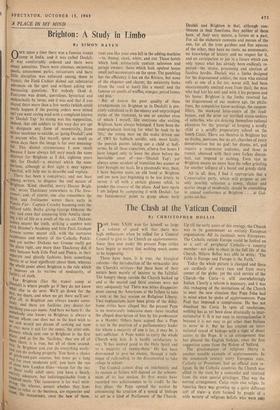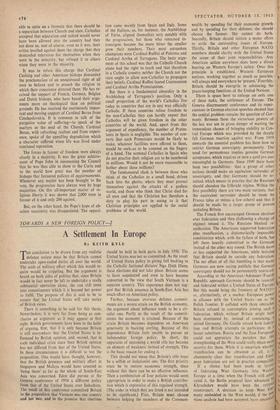The Clash at the Vatican Council
By CHRISTOPHER HOLLIS
nor.: JOHN XXIII won for, himself so large r a volume of good will that there was high enthusiasm when he called for a General Council to give to the Church an aggiornamento. Since then and under the present Pope critics have begun to mutter that nothing much seems to be happening.
There have been, it is true, the liturgical reforms--the introduction of the vernacular into the Church's services—but these have of their nature been mainly of interest to the faithful. The hungry sheep outside the Church looked up and at the second and third sessions were not very adequately fed. There was bitter disappoint- ment among the Americans at the failure to take a vote at the last session on Religious Liberty. Two explanations have been given of the delay. Some critics have alleged that the present Pope is an inveterately indecisive man—have recalled the alleged description of him by his predecessor as a Hamlet. Others have argued that a Pope is not in the position of a parliamentary leader for whom a majority of one is (or, it may be. is not) sufficient. A Pope wants to carry the whole Church with him. It is hardly satisfactory to say, 'It has seemed good to the Holy Spirit and to a majority of twenty-three.' He has been determined to give no excuse. through a tech- nique of railroading, to the discontented to take refuge in schism.
The Council cannot drag on indefinitely and its success or failure will depend on the achieve- ment of its last session. Its first weeks have recorded two achievements to its credit. In the first place, the Pope opened the session by announcing the creation of a synod of bishops to act as a kind of Parliament of the Church.
Up till the early years of this centusy, the Church was in its government an entirely European organisation. All its cardinals were Europeans. The Catholic outside Europe could be looked on as a sort of peripheral Catholic—a country member—not able to share in the full life of the Church. Hilaire Belloc was able to write: 'The Faith is Europe and Europe is the Faith.'
Today the whole picture is changed and there are cardinals of every race and from every corner of the globe, yet the civil service of the Church—the Curia—is still overwhelmingly Italian. Clearly a reform is necessary, and it was this reshaping of the institutions of the Church to meet the new situation that Pope John had in mind when he spoke of aggiornamento. Pope Paul has imposed a compromise. He has not dissolved the Curia. In spite of resolutions, nothing has as yet been done drastically to inter- nationalise it. It is not easy to internationalise it because it is not easy to get other than Italians to serve in it. But he has created an inter- national synod of bishops with a right of direct access to the Pope. It is an arrangement that has pleased the English bishops, since the first suggestion came from the Bishop of Salford. The proclamation of religious liberty is another notable example of aggiornamento. In the nineteenth century every European state, Catholic or Protestant, had an official state re- ligion. In the Catholic countries the Church was allied to the state by a concordat and received from the state special privileges. That was the normal arrangement. Chins regio emus religio. In America there was growing up a quite different sort of state—a state formed by people of a wide variety of religious beliefs who were only able to unite on a formula that there should be a separation between Church and state. Catholics accepted that separation and indeed would never have been allowed into the country had they not done so, and of course, even as it was, their critics levelled against them the charge that they demanded toleration for themselves when they we're in the minority, but refused it to others when they were in the majority.
It was to refute this charge that Cardinal Cushing and other American bishops demanded the proclamation of an unequivocal right of all men to believe and to preach the religion to which their conscience directed them. He has re- ceived the support of French, German, Belgian and Dutch bishops, who have based their argu- ments more on theological than on political grounds. He has received the enormously impor- tant and moving support of Cardinal Beran from Czechoslovakia. It is common to talk of the purgative value of suffering—to speak of the martyrs as the seed of the Church. Cardinal Beran, with refreshing realism and from experi- ence, spoke of the appalling degradation which a character suffered when life was lived under continual repression.
The forces in favour of freedom were always clearly in a majority. It was the great achieve- ment of Pope John in summoning the Council that he was thus able to show to the Curia and to the world how great was the number of bishops that favoured policies of aggiornamento. Whenever any matter has been brought to the vote, the progressives have always won by huge majorities. On this all-important matter of re- ligious liberty it was shown that 2,000 were in favour of it and only 200 against.
But, on the other hand, the Pope's hope of ab- solute unanimity was disappointed. The opposi- tion came mainly from Spain and Italy. Some of the Italians, as, for instance, the Archbishop of Turin, aligned themselves very notably with the progressives, but those who remained in- transigent became the more bitter the smaller grew their numbers. Their most outspoken champions were Cardinal Ruffini of Palermo and Cardinal Arriba of Tarragona. The basic argu- ment of this school was that the Catholic Church alone had the right to teach and that therefore in a Catholic country neither the Church nor the state ought to allow non-Catholics to propagate their beliefs. Cardinal Ruffini feared Communism and Cardinal Arriba Protestantism.
But there is a fundamental absurdity in the Archbishop of Tarragona's position. Only a small proportion of the world's Catholics live• today in countries that are in any way officially Catholic. If these countries refuse freedom to the non-Catholics they can hardly expect that Catholics will be given freedom in the other countries of the world. And, apart from this argument of expediency, the number of Protes- tants in Spain is negligible. The number of con- verts that such Protestants would be likely to make, whatever facilities were offered to them, would be such.as to be counted on the fingers of a hand. The nominal Catholics in Spain who do not practise their religion are to be numbered in millions. Would it not be more reasonable to bother about these millions?
The fundamental clash is between those who think of the Catholics as a small band, driven back into the ghetto, where they must protect themselves against the attacks of a godless world, and those who think that Christ died for all men and that the Christian has therefore a duty to play his part in seeing to it that Christian principles are applied to the social problems of the world.







































 Previous page
Previous page